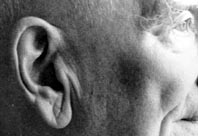 One in three Americans over the age of 60 have some degree of hearing loss. That figure jumps to 1 in 2 for those over 80.
One in three Americans over the age of 60 have some degree of hearing loss. That figure jumps to 1 in 2 for those over 80.For those with diabetes, the prevalence may be even higher.
An article that appeared in the Fall 2003 issue of Hearing Health explored the relationship between diabetes and hearing loss:
"Since vascular and nerve tissues play predominant roles in auditory function, any disease that has the capacity to damage their cells has potential to negatively affect the various hearing organs. A link between hearing and diabetes seems likely indeed if the rich blood supply to the cochlea and/or the nerve centers in the hearing pathways, including the brain, are affected."
The National Institute on Deafness and Other Communication Disorders (NIDCD) has an easy-to-read and comprehensive tutorial on hearing loss, including its causes, symptoms, treatment, and prevention. It recommends that if you answer "Yes" to three or more of the following questions, you have your hearing checked by a doctor.
- Do I have a problem hearing on the telephone?
- Do I have trouble hearing when there is noise in the background?
- Is it hard for me to follow a conversation when two or more people talk at once?
- Do I have to strain to understand a conversation?
- Do many people I talk to seem to mumble or not speak clearly?
- Do I misunderstand what others are saying and respond inappropriately?
- Do I often ask people to repeat themselves?
- Do I have trouble understanding the speech of women and children?
- Do people complain that I turn the TV volume up too high?
- Do I hear a ringing, roaring, or hissing sound a lot?
- Do some sounds seem too loud?
Finally, if you're having difficulty hearing, it may not be just a problem with your ears. Comprehension of what we hear takes place in the brain. As we age, the brain may lose some of its ability to filter out background noise.
Audiologists from the University of California, San Francisco, believe we can train our brain to recover listening skills - with or without a hearing aid. They've helped design an interactive software program with listening exercises that can be used on a personal computer. Free demonstration software is available at neurotone.com.*
For Hearing Health article:
Diabetes and Hearing Loss: Exploring Connections
For NIDCD's tutorial:
NIH Senior Health: Hearing Loss
For NeuroTone's Listening Software
Listening & Communication Enhancement (LACE) Training System
* Not an endorsement. For information only.